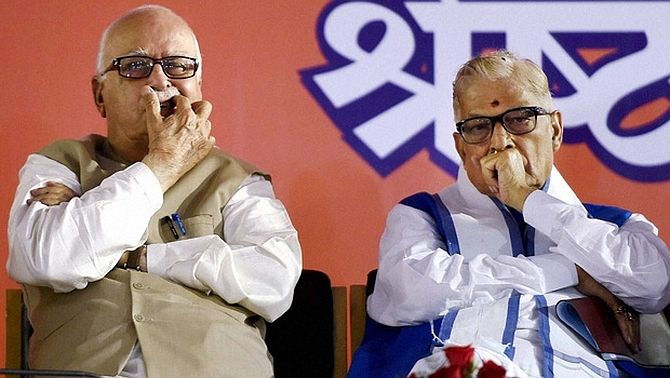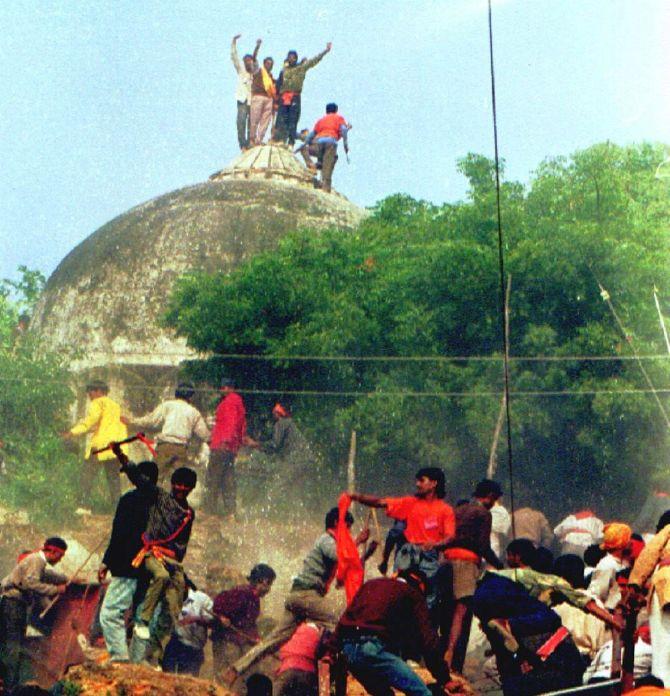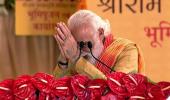'It cannot be that only in this case the CBI has developed a spine, refusing to heed the advice of its political masters.'
'There is something that does not meet the eye here,' notes Virendra Kapoor.

They say justice is blind. We have cast-iron proof it is.
For incontrovertible evidence, consider but only two cases of the sheer blindness of justice.
Both were tried by the special CBI court. In one case where there was ample evidence of the innocence of the accused, they were convicted of corruption.
And, in the other, where there was fool-proof evidence of corruption, they were allowed to go scot free.
That is justice, nay blind justice, for you.
Let us explain.
Last week, a special CBI court convicted Jaya Jaitley, a former president of the erstwhile Samata Party (now the Janata Dal-United) and three others for corruption and sentenced them to four years of imprisonment for trying to influence a defence deal and accepting illegal gratification for the same.
The facts are simple.
The Tehelka magazine undertook a sting operation against then defence minister George Fernandes and a few other notables associated with the Atal Bihari Vajpayee government.
Fernandes, one of the fiercest critics of the Nehrus, was the main target of the entrapment sting.
Unable to reach him, the sting operators managed to speak to his associate, then Samata Party chief Jaya Jaitley.
Claiming they were treated unfairly by people in the defence ministry, they sought her help.
She said she had no say in the ministerial matters.
However on their persistence, pleading grave injustice was being done to them, she asked them to leave a petition which she would pass on to the minister's PA. That was that.
Now comes the crucial part. And it is all on tape.
The stinger now says they want to give donation to the party.
Jaitley says she does not concern herself with the party finances and if they so insist they can approach the party treasurer.
But determined to trap her, and show that illicit money changed hands for defence deals in the minister's house, the undercover reporter pretending to be a representative of a London-based arms company, insists on giving money anyway.
Now the reporter changes tack, saying that the Samata Party convention is to be held in Bengaluru soon and the party would need funds.
Again, her response remains unchanged.
She does not accept donations. But determined to target Fernandes, the stinger finds an unknown person hanging around in the house.
They thrust Rs 2 lakhs (Rs 200,000) into his hands and secretly record the video. Mission accomplished.
But here is the point. Neither the Tehelka reporter nor his bosses knew vaguely the identity the person on whom they had forced a wad of cash.
It was much later they would find out that the person concerned was an old Socialist party worker from Rajasthan who had come to meet Fernandes in connection with the upcoming Samata Party convention in Bengaluru.
Twenty years later, on the basis of the above entrapment tapes, a CBI court convicted Jaitley and three others.
Mercifully, the Delhi high court stayed the order in the nick of time.
Hopefully, on appeal the conviction will be overturned. Because the facts fly in the face of what is the real truth.
Now take the 2G case.
Here again the facts are simple. Consider them.
In only one of the several transactions in which bribes were paid and duly established by the CBI, Rs 200 crores -- yes, two hundred crores -- was given by one of the parties that had applied for the 2-G license -- and which was duly granted.
The money trail was clearly traced, and the link between the party that had bagged the license and the bribe-taker in Chennai was clearly established beyond an iota of doubt.
Only after the 2-G scam became public and rocked Parliament, did the bribe-taker post-haste raise funds from third parties to return the bribe amount to the licensee in order to claim that no bribes were taken.
The investigation was so thorough that it had also traced the source of funds the bribe-taker had raised after the scandal became public.
The evidence of the bribe being accepted, and much later, being returned from funds hurriedly raised through third party sources was presented before the special CBI court.
Yet, the court allowed all the accused to walk free.

Meanwhile, it is a moot point why the CBI cases in the Ayodhya demolition case against a number of high profile accused is still being tried, especially at a time when the bhoomi puja for the Ram temple has taken place.
Given that the CBI has withdrawn several cases on political grounds, the continuation of the trial in the Ayodhya demolition case is particularly surprising.
No less surprising is the fact that veteran BJP leaders L K Advani and Murli Manohar Joshi, were made accused in the case well after the Modi government came to power.
It cannot be that only in this case the CBI has developed a spine, refusing to heed the advice of its political masters.
Even if Advani, Joshi and others were made accused at the instance of higher courts, the CBI was expected to press for relief, which it has failed to do so far, especially given the age of the BJP Margdarshaks.
There is something that does not meet the eye here.
Feature Presentation: Aslam Hunani/Rediff.com










